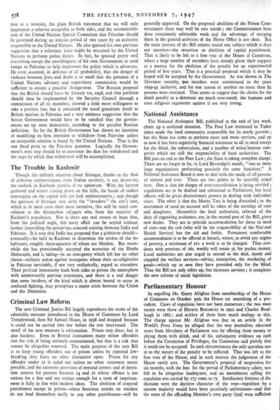Criminal Law Reform
The new Criminal Justice Bill largely reproduces the terms of the admirable measure introduced in the House of Commons by Lord Templewood, then Sir Samuel Hoare, in 1938 and dropped because it could not be carried into law before the war intervened. The motif of the new 'measure is reformation. Prison may deter, but it also hardens. Even in Borstal institutions many minor offenders run the risk of being seriously contaminated, but that is a risk that cannot be altogether removed. The main purpose of the new Bill is to keep young offenders out of prison unless by repeated law- breaking they leave no other alternative open. Prison for any offender under 21 is ruled out unless no other treatment seems possible, and the extensive provision of remand centres and of deten- tion centres for persons between Li and 21 whose offence is too serious for a fine and not serious enough for a term of imprison- ment is fully in line with modern ideas. The abolition of corporal punishment except in prison—where ferocious attacks on warders do not lend themselves easily to any other punishment—will be generally approved. On the proposed abolition of the Prison Com- missioners there may well be two minds ; the Commissioners have done consistently admirable work and the advantage of merging them in the general activities of the Home Office is not clear. But the main interest of the Bill centres round one subject which it does not mention—the retention or abolition of capital punishment. That is likely to be left to a free vote of the House of Commons, where a large number of members have already given their support to a motion for the abolition of the penalty for an experimental period of five -years. That is a practical proposal which it may be hoped will be accepted by the Government. As was shown in The Spectator recently, goo murders were committeed in the years 1939-45 inclusive, and for one reason or another no more than 82 persons were executed. That seems to suggest that the claims for the death penalty as a deterrent are much over-rated; the humane and even religious arguments against it are very strong.


































 Previous page
Previous page